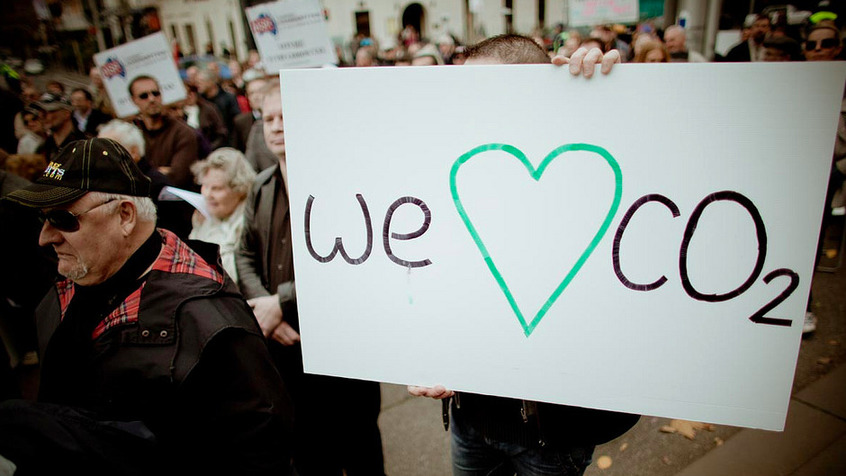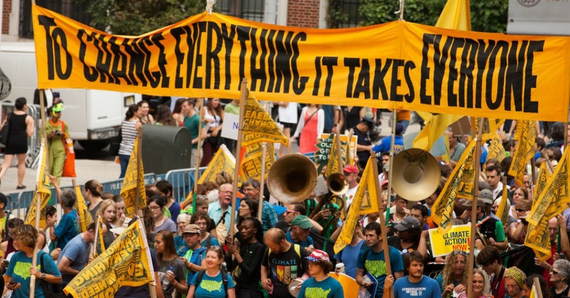Coming to Terms with Climate Reality

How to respond to an existential crisis? The greatest individual existential crisis we can experience is that of coming to terms with our own imminent death, or that of coming to terms with the death of a loved one. Elisabeth Kübler-Ross famously distinguished five stages in this process: denial, anger, bargaining, depression and acceptance.
We are now experiencing a global and collective existential crisis: that of coming to terms with the fact that our present civilization is finished. Climate change is real, and this reality is going to disrupt our lives in unprecedented ways. In fact, these disruptions have already begun. And in the way various groups and individuals are responding to this reality we can detect Kübler-Ross’ five stages of grief.
To escape the dire future that awaits us if we just try to reform we need a revolution. We need to give up the growth principles that fueled our industrial civilization, and build a new post-industrial society on new principles. We need to accept that this civilization is finished. We need to abolish capitalism. We need to reinvent our money system, so that making money with money becomes impossible. We need to relearn the solidarity of giving and sharing. We need to completely and radically give up the idea of economic growth. We need to wean ourselves off cheap and abundant energy from fossil fuels. We need to reform and localize our food production. We need to give up or drastically reduce our meat consumption. We need to relearn eating more frugally and with the seasons. We need to use water more efficiently. We need to learn to use natural resources with care, and to only produce waste that can be recycled.
In short, we need to finally come to terms with the fact that we are living on a finite planet, and that we are not masters of nature but part of it. And we need to do all of that now. This entails many things. And the first thing is coming to terms with this reality, privately and collectively. What we can see now is that groups and individuals are at very different stages in this process.
What Can we Know? What Can we Expect?
We can know that our future, say for the next fifty years, will be vastly different from our past, say of the last fifty years. This entails that we can know that the lives of our children will be vastly different from our own lives. It is very probable that life expectancy will plummet. Will there be a sudden collapse? Or a more gradual transition to a new state? We cannot know.
Lethargy and ‘Playing Dead’
We, me and my family, have a nice house in the centre of Amsterdam. It was built around 1700 as an annex to a canal house, so it has existed for more than three centuries. Recently we fixed its foundations, so our very fine house is now ready for a few more centuries. Only, if the predictions of the IPCC are correct - and according to many climate scientists they are an underestimation - then there can be reasonable doubt that Amsterdam will still exist a century from now. Still, if we decide to sell the house tomorrow, we will have absolutely no difficulty in finding an eager buyer.
Many people are aware, at some level of apprehension, that we are living in extraordinary times, that this is not a time for business as usual. But it is tempting to keep doing as the neighbours do. It is difficult to live in truth. It is hard to pay attention to the voice inside that tells us what is important and what is not. It is much easier to be distracted by media entertainment, especially if what reality has to tell us is not at all pleasant to engage with. It is difficult to take charge of our own lives.
Anger at the Messengers

It is very common for academics, climate scientists and environmentalists who speak up about the dangers of global warming, to receive angry feedback from climate deniers. When philosopher Lawrence Torcello took aim at climate deniers in 2014, saying that “public uncertainty regarding climate science, and the resulting failure to respond to climate change, is the intentional aim of politically and financially motivated denialists”, his institute received more that 700 pieces of hate mail. When geologist Jess Phoenix appeared on CNN in 2018, and linked Hurricane Florence to climate change - saying that global warming doesn’t cause hurricanes but does make them worse - she was attacked and misrepresented in the radio program of Rush Limbaugh, and received death threats as a result.
And she wrote an eloquent response. Here is a quote:
I am a scientist. I am explaining that human activities are fueling climate change, a link we have known about since 1896. If I actually launched into the technicalities I would be failing to do my job of communicating complex concepts succinctly and clearly for a general audience. The jet stream shift is driven by the expansion of warm, tropical air into regions that were not warm previously. Sea levels are rising. Sea temperatures are increasing. I am not going to give a basic physics lesson on the effects of heat on closed systems every time I’m on TV. The science is settled. We do not debate whether the sky is blue every time someone says it’s green.
And a bit further on:
I wish science didn’t need defending on TV. I wish there wasn’t a documented, concerted effort by the fossil fuel industry to spread lies about environmental & climate science that was patterned after the campaign by big tobacco to discredit the science about smoking’s health impacts. Unfortunately, that’s the world we live in. Crackpots like Limbaugh and Trump can question objective reality and people believe it.
Indeed, people got very angry at her for saying these things, for speaking the plain truth as she sees it, backed up by her training in physics. Getting angry about this is like getting angry at your doctor for conveying bad news about your health, blaming a messenger for the inconvenient truth that she brings. Climate denialism fits in Kübler-Ross’ second stage of grief.
But one complicating factor is that popular media moguls can make a lot of money by stirring up controversies and by twisting facts. Another complication is that in reflections on climate change facts become easily mixed up with ideology. People who are ideologically committed to capitalism refuse to take in the science findings because of the dire implications for their pet beliefs. And climate deniers are masters of turning things around: they sincerely believe that they are rational while the scientists act from a hidden agenda of trying to secure funding, or getting rid of capitalism.
False Hope and Shallow Optimism
The attitude of mainstream politics can be summed up in the confident quote of Barack Obama: “We can still act, and it won’t be too late.” Leave it to us, politicians. Every climate conference where nothing gets achieved and where no real commitments are made is hailed as an essential step forwards.
The problem is that our most capable mainstream politicians are trained in dealing with the soft realities of people’s beliefs, and not with the hard limits imposed by physical reality. That is, our most successful politicians are trained in magic rather than in science. Magic, in the useful definition of Ioan P. Couliano, specialist in the history of magic in the Renaissance, is the attempt to use will to influence the imagination and the beliefs of individuals and groups.
At its greatest degree of development, reached in the work of Giordano Bruno, magic is a means of control over the individual and the masses based on deep knowledge of personal and collective erotic impulses. We can observe in it not only the distant ancestor of psycho-analysis but also, first and foremost, that of applied psycho sociology and mass psychology.
Insofar as science and the manipulation of phantasms are concerned, magic is primarily directed at the human imagination, in which it attempts to create lasting impressions. The magician of the Renaissance is both psychoanalyst and prophet as well as the precursor of modern professions such as director of public relations, propagandist, spy, politician, censor, director of mass communication media, and publicity agent.
Ioan P. Couliano, Eros and Magic in the Renaissance.
If we reflect but briefly on the ways in which our beliefs are shaped by means of media stories, advertisements and propaganda, we can see that we are all living in a mental world created by magic. And it is very hard to undo the spells that entertainers, lobbyists and politicians are trying to cast over us.
But the fact that politicians can make us believe they are dealing with a problem does not mean that they are really dealing with it on the level of physical reality. Reality has nothing to do with collective belief. Reality is that which does not go away if we stop believing in it, in the concise definition of science fiction writer Philip K. Dick.
Despair and Paralysis

The records of how much carbon dioxide there is in the atmosphere are going up and up. From a mean value of 313 parts per million in 1958, when Charles David Keeling started collecting samples for the famous Keeling curve, increasing by about 2 parts per million per year, to more than 400 parts per million today. This is physics, not political waffle.
Reducing our individual carbon footprint matters, but unless this behaviour becomes global and universal, climate scientist David Reay calls this pissing in a hurricane. So what can we do as individuals? Despair is a huge problem among activists and ecologists right now. And it is the fourth stage of grieving about the climate, about the loss of so much beauty on this wonderful blue planet, about the dangers that are looming for us and for those we love.
Realism and Finding a Way Forward

The turn to realism can only happen once we accept the previously unacceptable. The climate is changing, and this will affect us in a huge way. The lives of our children will look grim compared to our own lives. The myth of material progress that most of us believed in has turned out an illusion. The cornucopia of riches, the abundance of an incredible variety of foods and drinks to sample, the almost limitless possibilities for entertainment and exotic travel, it was all made available to us by using up the energy stored in fossils during billions of years, using up all that energy in the course of just a few generations. And now it is almost gone, forever. Mind you, the abundance was unequally shared. Some never took part in it. For many the feast is already over. It will soon be over for us, too.
So how can we find a way forward? We will need to muster hope, but we cannot rely on the kind of hope that draws its strength from chances of a good outcome. We need to train ourselves to act from a different kind of hope, the hope of intention, as activist and spiritual teacher Joanna Macy calls it. The hope of intention is hope based on how we picture ourselves, hope based on the role we and our fellow hopefuls wish to play in the bleak times ahead.
Finding Meaning
What is the purpose of human life? How do we measure our lives after we have given up false hope? Where can we find meaning in the face of extinction? Here we are entering the realm of metaphysics. Scientific materialism was teaching us to find meaning in the idea of material progress. It follows that scientific materialism is not a useful metaphysical foundation for a new society. We need a new metaphysics, and we should consult with spiritual teachers such as Thich Nhat Hanh, Joanna Macy, Jane Goodall to help us with that. Below are some reading and viewing suggestions on the theme of engaged spirituality.
Green House Think Tank, Facing up to Climate Reality
Joanna Macy Working Through Environmental Despair
Beth Green, Living With Reality
Thich Nhat Hanh, The World We Have
Jane Goodall, Call For Billions Of People To ‘Make Ethical Choices’ To Save The Planet